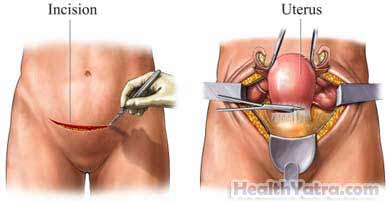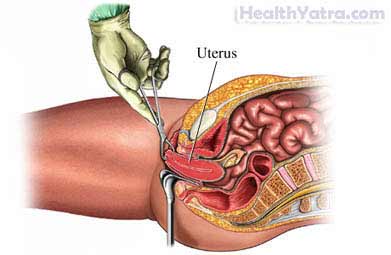Definition
Hysterectomy is the surgical term for the removal of the uterus (womb). This results in the inability to become pregnant.
There are different types of surgeries, such as:
- Supracervical hysterectomy—removal of the uterus only
- Total hysterectomy—removal of the uterus and cervix (the opening of the uterus leading to the vagina)
- Radical hysterectomy—removal of the uterus, ovaries, fallopian tubes, upper part of the vagina, and the pelvic lymph nodes
- Salpingo-oophorectomy—removal of the ovaries and fallopian tubes (may be combined with any of the above procedures)
Reasons for Procedure
You may have a hysterectomy if your uterus is causing health problems that cannot be treated by other means. Some reasons a woman may have a hysterectomy are to:
- Treat cancers (such as uterine, endometrial, and ovarian cancers)
- Remove uterine fibroids
- Treat conditions (such as chronic pelvic pain, heavy bleeding)
Explore your options before having a hysterectomy. There are other treatments for many of these problems.
Possible Complications
If you are planning to have hysterectomy, your doctor will review a list of possible complications, which may include:
- Reactions to anesthesia
- Pain
- Infection
- Bleeding
- Fatigue
- Injured pelvic organs (bowel and/or bladder)
- Urinary incontinence (problems controlling your urine)
- Loss of ovarian function and early menopause
- Depression
- Sexual dysfunction
Some factors that may increase the risk of complications include:
- Obesity
- Smoking
- Heart or lung disease
- Diabetes
- Previous pelvic surgery or serious infection
- Use of prescription and nonprescription drugs during the past month
Be sure to discuss the risks with your doctor before surgery.
What to Expect
Prior to Procedure
Your doctor may do the following:
- Blood and urine tests
- X-ray of abdomen and kidneys
- Pelvic ultrasound—a test that uses sound waves to visualize organs in the abdomen
- Dilation and curettage (D&C)—surgical removal of tissue from the lining of the uterus (to check for cancer)
You should do the following:
- Talk to your doctor about your medicines. You may be asked to stop taking some medicines up to one week before the procedure, such as:
- Aspirin or other anti-inflammatory drugs
- Blood thinners, such as warfarin (Coumadin)
- clopidogrel (Plavix)
- If instructed, take enemas to clean out your intestines.
- Arrange for a ride home and for help at home.
- Eat a light meal the night before the surgery. Do not eat or drink anything after midnight.
Anesthesia
General anesthesia is usually used for this surgery. Anesthesia blocks pain and keeps you asleep through the surgery. It is given through an IV in your hand or arm.
Description of the Procedure
You may be given antibiotics just before surgery. There are two different methods that are described here.
Open Abdominal Hysterectomy
The doctor will make a cut in your lower abdomen. This is done to expose the tissue and blood vessels that surround the uterus. The tissue will then be cut. The blood vessels will be tied off. The uterus will be removed. Next, the doctor will sew the tissue back together and close the skin with stitches or staples. If the cervix is also removed, you will also have stitches put in the back of your vagina.

Open Vaginal Hysterectomy
This method will not involve any outside incisions. The doctor will stretch the vagina and keep it open with special tools. Next, the doctor will cut free the uterus and cervix. The connecting blood vessels will be tied off. The doctor will then remove the uterus and cervix through the vagina. Lastly, the doctor will close the top of the vagina with stitches.

With each procedure, a vaginal “packing” (sterile gauze) is placed in the vagina. This will be removed after 1-2 days.
Immediately After Procedure
In the recovery room, you will have IV fluids and medicines.
How Long Will It Take?
1-3 hours
Will It Hurt?
You will not have pain during the surgery because of the anesthesia. During your recovery time, your doctor will give you pain medicine.
Average Hospital Stay
- Abdominal hysterectomy: 3-5 days
- Vaginal hysterectomy: 1-2 days
Your doctor may choose to keep you longer if you have any complications.
Post-procedure Care
At the Hospital
While you are recovering at the hospital, you may receive the following care:
- On the first night, you may be instructed to sit up in bed and to walk a short distance.
- During the next morning, the IV will probably be removed if you are eating and drinking well.
- You may need to wear special stockings or boots to help prevent blood clots.
- To help you urinate, you may have a Foley catheter in your bladder.
At Home
During the first few days, you may have pain, bloating, vaginal bleeding, and vaginal discharge.
When you return home, do the following to help ensure a smooth recovery:
- Follow your doctor’s instructions.
- Take proper care of the incision site. This will help to prevent an infection.
- Ask your doctor about when it is safe to shower, bathe, or soak in water.
- During the first two weeks, rest and avoid lifting.
- Slowly increase your activities. Begin with light chores and short walks. Depending on your job, you may be able to return to work.
- Check with your doctor to see when it is safe to drive again.
- To promote healing, eat a diet rich in fruits and vegetables. Ask your doctor if you need to take iron.
- Try to avoid constipation by:
- Eating high-fiber foods
- Drinking plenty of water
- Using stool softeners if needed
- Ask your doctor when you can use tampons. Also ask about Kegel exercises.
- Wait six weeks before resuming sexual activity.
- If you still have a cervix, you will still need regular Pap smears.
Recovery from open abdominal hysterectomy usually takes 6-8 weeks.
Call Your Doctor
After you leave the hospital, call your doctor if any of the following occur:
- Signs of infection, including fever and chills
- Redness, swelling, increasing pain, excessive bleeding, leakage, or any discharge from the incision site
- Incision opens up
- Nausea and/or vomiting that you cannot control with the medicines you were given or that last longer than two days
- Dizziness or fainting
- Cough, shortness of breath, or chest pain
- Heavy bleeding
- Pain that you cannot control with the medicines you have been given
- Pain, burning, urgency or frequency of urination, or persistent blood in the urine
- Swelling, redness, or pain in your leg
In case of an emergency, call for medical help right away.
